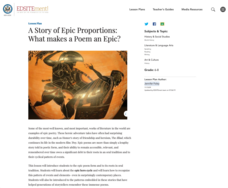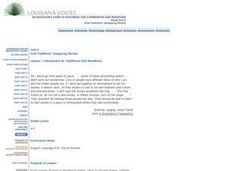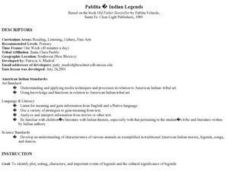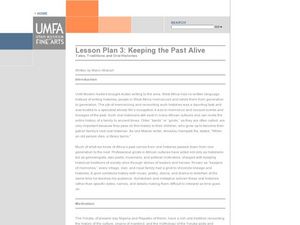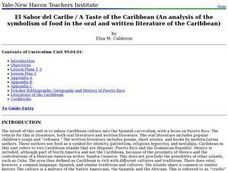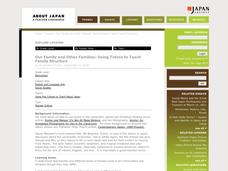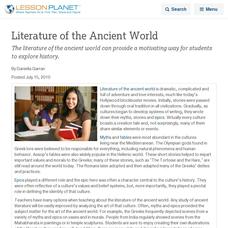National Endowment for the Humanities
A Story of Epic Proportions: What Makes a Poem an Epic?
Learners analyze the epic poem form and its roots in oral tradition. In this epic poetry instructional activity, learners research the epic hero cycle and recognize the pattern of events and elements. Learners analyze the patterns...
Annenberg Foundation
Native Voices
The Navajo people build their dwellings with the doors facing the rising sun in the east to welcome wealth and fortune. Pupils learn about the traditions of the Navajo people in the first part of a 16-part unit. They explore American...
Curated OER
Korea's Literary Tradition
Students read a text about Korea's literary tradition. In this literary tradition lesson, students read the multiple page text to learn about Korea's literary tradition.
Curated OER
African American Poetry: Family and Traditions
Learners are introduced to the elements of African-American poetry. As a class, they are read different types of poems to discover there are different styles of poems and practice rhyming words. They share information on their family...
Curated OER
Introduction to Traditional Oral Narratives
Students are introduced to the idea of traditional oral narratives and divide them into genres. They explore the genres of context, motifs and variants. Each student finds oral narratives in their own lives and practice retelling them in...
Curated OER
Dialect Poems of Paul Laurence Dunbar
Students examine the life and works of Paul Laurance Dunbar. In groups, they read various poems of his and use a database to examine the covers of his books. They also discuss the criticism he faced during his life and how he dealt...
Curated OER
Pablita Indian Legends
Scholars are introduced to the characteristics of a legend. They read and discuss Old Father Story Teller by Pablita Velarde. Then, in groups, they write and illustrate a poem based on one of the legends from the book. This lesson plan...
Curated OER
A Heritage Study: Using Information Resources to Research Family History and Traditions
Students research their family history through ethnographical study. They locate information through a variety of sources, interview people, write a report and present an oral presentation to the class.
Carolina K-12
Affrilachia
What makes a culture unique? Learners research life in the Appalachia region of the United States. Poetry, music, and oral history create Affrilachia, the term used to describe the lifestyle of the area. African-American mountain culture...
Curated OER
Keeping the Past Alive
Students read about the oral histories of West Africa and complete related activities. In this oral histories instructional activity, students read about the importance of oral customs in African cultures. Students interview a family...
Curated OER
A Taste of the Caribbean
Students are introduced to the foods and traditions of the Caribbean. In groups, they brainstorm their own definition of culture and review the physical and political geography of the Caribbean. They spend time sampling different foods...
Curated OER
Personal Experience Narratives
Help your middle schoolers identify personal experience narratives in their own lives through telling stories themselves and from family members or other adults. They study personal experience narratives in Swapping Stories and compare...
Curated OER
Oral History: Interviewing Elders
Sixth graders examine oral history traditions. They interview family members about their childhoods and compare them to their own. Students use the collected information to make posters, letters, essays, or poems about their research.
Japan Society
Our Family and Other Families: Using Totoro to Teach Family Structure
What do families around the world have in common? Explore this theme through the popular animated film My Neighbor Totoro by Hayao Miyazaki. Over the course of two days, pupils view the film, pausing to discuss their own families and the...
Curated OER
Voices of Louisiana Worksheet
In this voices of Louisiana worksheet, students choose at least three quotations from the Voices of Louisiana webpage and look for clues about each person's folk groups and the genres they mention; for example, oral tradition, folk...
Curated OER
American Families: Portraits of African-American Families
Students develop a greater understanding and appreciation for their families. They increase personal self-esteem and pride as a result of studying about families through literature. They assess the importance of family values and...
Curated OER
Treasures of the Silk Roads
Students examine and discuss art objects from the Silk Roads. They analyze images of artifacts, create a word map, and develop and write a short story or poem based on the slides viewed.
Curated OER
Reporting Live From...
Students examine the many disasters in West Virginia. In this US history lesson, students write about and give an oral presentation of one of the disasters as if they were reporters.
Curated OER
Free Speech Comes At a Price
Students use communicative activity strategy, Go, Ask and Tell, or more traditional whole text comprehension activity to read, discuss and explore issues in article, Free Speech Comes at a Price, by Hugh Mackay.
Curated OER
Exploring Arthurian Legend
Students investigate the evolution of the King Arthur stories and analyze them as a window into the culture that preserved them. They trace the legends through their earliest versions through medieval and Victorian times and into the...
Curated OER
Literature of the Ancient World
The literature of the ancient world can provide a motivating way for students to explore history.
Curated OER
The Roadmap to the Jewish Golden Age of Spain
Students discover, through analysis of media and of primary source historical documents, how Jews achieved high levels of assimilation and acceptance under Islamic rule during the Golden Age of Spain, from the tenth to the twelfth century.
Curated OER
What Does Korean Literature Reveal About War?
Students are exposed to a wide variety of war related literature in order to comprehend the influence of conflict upon the lives of the Korean people. The information is used to complete a research report.
Curated OER
Culture in Atlantic Canada
Ninth graders discuss the aspects of culture and what makes them unique. In small groups, 9th graders use digital cameras to take photos. Groups use their pictures to create a PowerPoint presentation storyboard of their culture.
